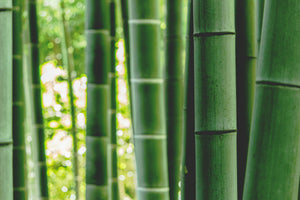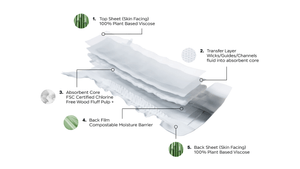Plant-Based Materials
Our diapers prioritize plant-based non toxic materials over old-fashioned plastics, and are independently certified hypoallergenic (derma tested and OEKOTEX rated).

Our Plants
Inside and outside layers of our diapers, and the entire substrate of our wipes, are made with materials sourced from plants.
When possible, we further reduce the impact by opting for responsibly managed sources, certified by the FSC®.
Certifications
Our diapers and wipes are USDA Certified BioPreferred and OEKO TEX® Standard 100 compliant

DermaTest® ★★★★★
Our diapers have undergone clinical application study under dermatological control. They were used during a period of four weeks by 20 randomly selected subjects once a day.
From the clinical-dermatological point of view, no relevant skin reactions occurred; the product was tolerated excellently.
Neither intolerance reactions suggestive of irritation nor allergic reactions (contact dermatitis) were detected. Accordingly, from the dermatological viewpoint, there is no high potential for irritation and sensitisation for the tested product when this is used as intended.
FAQ
Why use plants at all?
Plants are renewable and more sustainable than using conventional plastic. When coverted into viscose, they exhibit similar technical properties to polyurethene, but without reliance on fossil-fuels.
Why can't everything be 100% plant-based?
Some of our products, like wipes, are made with 100% plant-based substrate. Others, like diapers, are made with plant-based liners and core.
The balance of materials, like the superabsorbent polymers, elastics, glues or fastening systems, are currently not available at scale or with performance needed for daily use.
Is being plant-based better for the planet?
It is a very difficult question to answer. We believe that making items out of renewable sources contributes to the planet's well being. There are many other considerations, including end-of-life suitability where plants exhibit greater degradability than plastic counterparts. However, there is no perfect diaper and ours is no different.
Why can't I compost myself?
Composting of human waste requires specialized conditions including safe material handling procedures and specific pre-processing steps. Very few composting facilities exist around the country that are properly licensed and equipped to handle this type of waste stream.




